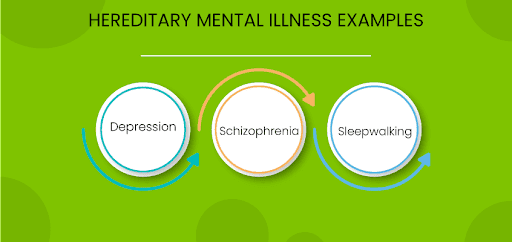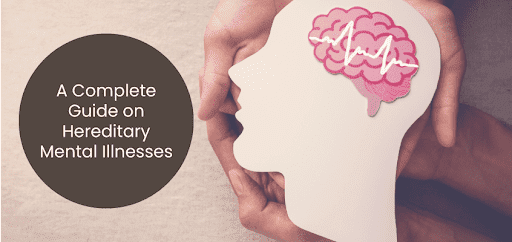Introduction
Mental health is a state of mental well-being where a person is aware of their abilities, can cope with regular stressful episodes very efficiently, is productive, and can take care of oneself and others. Certain life-changing events or situations can trigger mental illnesses in many individuals, causing temporary or permanent damage. However, some mental conditions are hereditary as well.
Our Wellness Programs
What is hereditary mental illness/genetic predisposition?
A hereditary mental illness refers to mental health conditions passed on from the parents to their offspring during reproduction. Mental illness or mental health disorders include various conditions that drastically affect mood, thinking, behaviour, and overall well-being. Genetic predisposition is a greater chance of developing a particular mental illness due to the inherited genetic makeup. However, the genes present in such an individual increase the risk factors of developing the diseases instead of being a direct cause. Along with genetic combination, the various environmental factors strongly influence the chances of suffering from a mental health disorder.
Mental health is a sensitive topic in our society, considering people are still sceptical of open discussions and debates. Mental illness or mental health disorders are not to be ashamed of as they can affect any individual at any age, irrespective of ethnicity, social background, religion, race, and more.
Looking for services related to this subject? Get in touch with these experts today!!
Experts

Neelam Parwani

India
Life Coach
Experience: 5 years

Mansi Chawla

India
Psychologist
Experience: 12 years

Sapna Zarwal

India
Psychologist
Experience: 19 years

Deepti Gandhi

India
Life Coach
Experience: 6 years
What is the list of hereditary mental illnesses?
Here is a list of hereditary mental illnesses that can affect any individual or trigger them by specific incidences in life:
- Psychotic disorders
- Anxiety disorders
- Personality disorders
- Eating disorders
- Dissociative disorders
- Developmental disorders
There are specific genes or D.N.A. codes related to mental health disorders. In the case of inherited genes, they may contribute to more than one type of mental health illness and symptoms. The effects of the genes may develop in early life during childhood or later in life under stressful circumstances or incidences.
Hereditary mental illness examples

Genetic and environmental factors are crucial in triggering some mental health issues. However, certain mental illnesses have a strong genetic basis for their occurrence, especially if your close family member has suffered from them. Specific hereditary mental illness examples include:
- Depression
- Schizophrenia
- Sleepwalking
- Autism
- Post-traumatic Stress Disorder
- Anorexia nervosa
- Split personality disorder
- Dyslexia
- Dementia
- Generalised anxiety disorder
- Bipolar disorder
Hereditary mental illnesses can alter the brain chemistry and networking resulting in disturbed behaviour from an affected individual. Anxiety, extreme stress, pessimistic attitude, substance abuse, mood swings, etc., may also trigger mental disorders. Intake of alcohol, drugs, and tobacco can worsen mental health problems and symptoms.
Where can you find support if you have a hereditary mental illness?
Diagnosing mental health disorders is challenging. Most people believe that mental health illnesses are taboo, curses, and the karma of past life affects “bad people.” According to the National Mental Health Survey statistics in 2016, around 14% of the Indian population suffered from mental health disorders. Their reports also stated that roughly 56 million people suffered from depression, and almost 38 million had anxiety disorders. Such people must seek professional help and treatment from a licensed medical psychiatrist or counselling. Nowadays, licensed experts and therapists offer numerous online therapy and counselling services. You can reach out to the professional experts at United We Care and find support if you have hereditary mental illnesses. Mental illnesses often require medical treatments in extreme cases or professional therapy sessions to understand self-emotions and how to deal with the psychological symptoms.
How can you cope with hereditary mental illness?
Coping with hereditary mental illness can be challenging without professional help or treatment. Suppose you know someone in your family or friends circle who exhibits mental health symptoms such as mood swings, anxiety, helplessness, despair, personality changes, etc. In that case, it is crucial to remind them that open communication and professional help are essential. Here are some coping strategies in case you know someone who has a hereditary mental illness:
- Accept how they feel instead of denying their feelings with false hope.
- Handle their odd behaviours, such as anger outbursts, social withdrawal, anxiety, etc., with patience. Try to empathise and communicate freely without holding any judgments.
- Seek emotional support from friends and family
- Therapy is very beneficial in diagnosing and treating a specific mental health illness. It is a long process but highly effective to bounce back into a world filled with optimism.
What are the treatment options for hereditary mental illness?
Hence the treatment for hereditary mental illness depends on the type of the illness and its severity. So getting treated for mental illnesses by a psychiatrist or attending regular therapy sessions to heal yourself is crucial. Psychiatrists can prescribe medications to treat hereditary mental health disorders apart from counselling and therapy sessions. Some commonly used prescriptions are:
- Antidepressants – to treat depression and chronic anxiety issues.
- Anti-anxiety medicines treat panic episodes, generalised anxiety disorders, insomnia, etc. Doctors usually prescribe them for short-term use due to the possibility of addiction or dependency.
- Mood-stabilizers – are used to treat bipolar disorders, mania, and depression.
- Antipsychotic medicines – are potent drugs used to treat mild and severe psychotic disorders such as schizophrenia, substance-induced psychotic disorder, paraphrenia (paranoid schizophrenia), etc.
Doctors recommend these medical drugs with a combination of therapy sessions for an effective treatment plan.
Conclusion
India has a long way to go in the battle against mental health disorders. Now it is worrisome to know that people do not openly communicate about mental health issues even today. So the main reason is a lack of awareness amongst the crowd and denial regarding hereditary mental illness. However, it is time we take care of ourselves and others by acknowledging that mental health illness affects every person, regardless of their societal status, gender, age, and other factors.
















